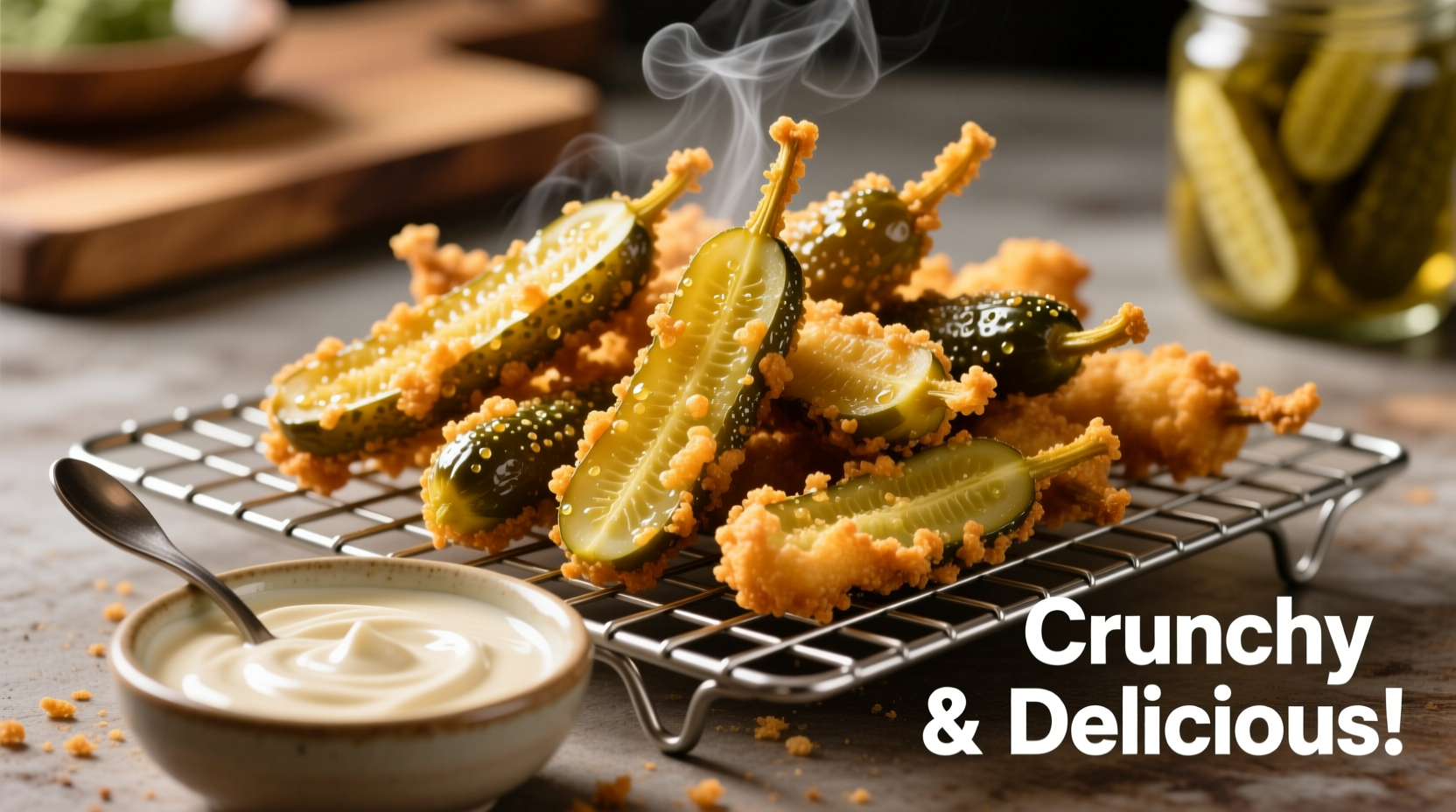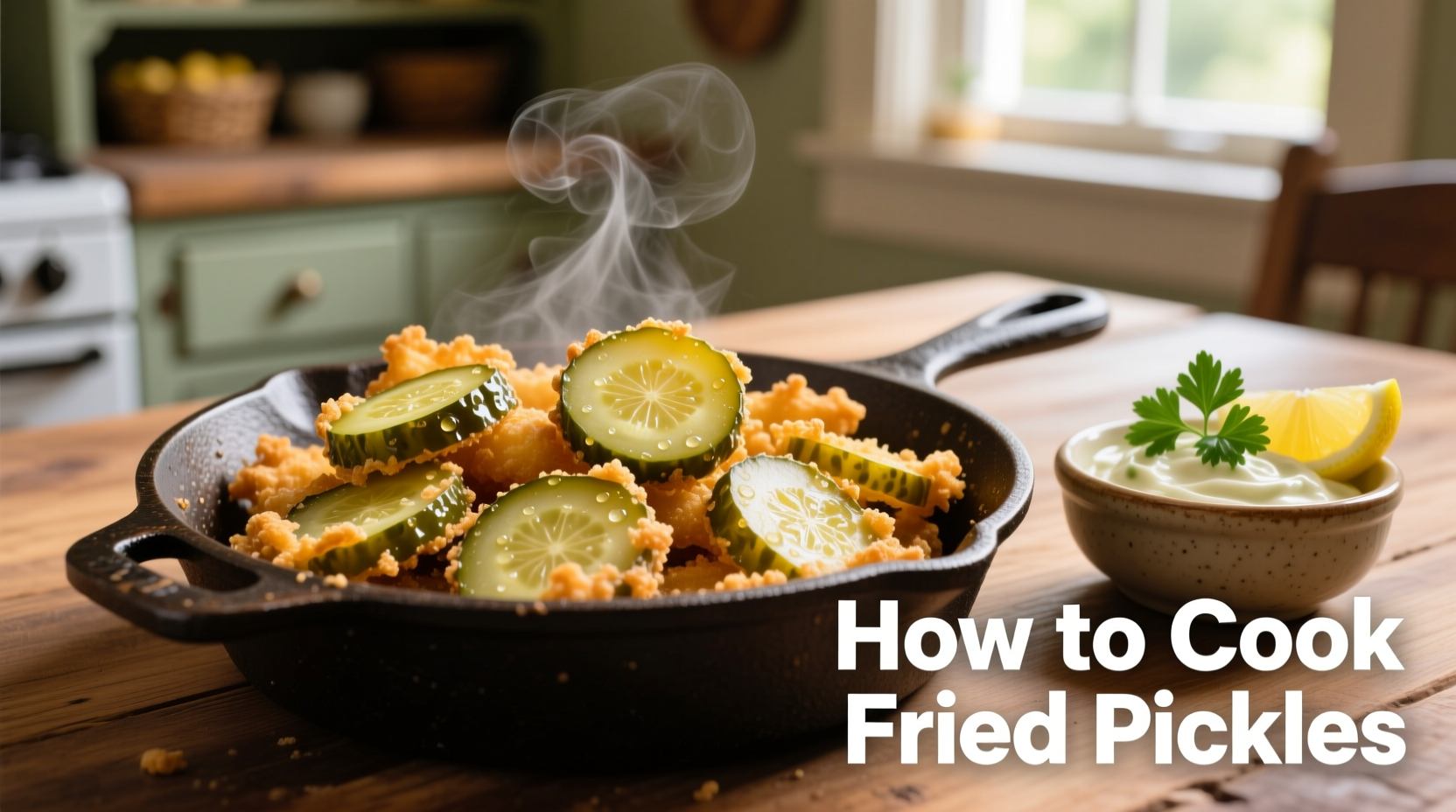The Science Behind Crispy Fried Pickles
Fried pickles have become a beloved bar snack across America, but achieving that perfect crunch-to-tang ratio at home requires understanding the food science involved. The magic happens through three key principles: moisture control, batter adhesion, and precise oil temperature.
According to USDA food safety guidelines, maintaining oil between 325-375°F ensures proper cooking without excessive oil absorption. When pickles hit the hot oil, surface moisture instantly vaporizes, creating that signature crispness while preserving the tangy interior. The buttermilk’s acidity helps break down pickle surface proteins, creating microscopic grooves for the cornmeal batter to grip onto.
| Oil Type | Smoke Point (°F) | Flavor Impact | Best For |
|---|---|---|---|
| Peanut Oil | 450 | Neutral | Deep frying (ideal) |
| Corn Oil | 450 | Slightly sweet | Deep frying |
| Canola Oil | 400 | Very neutral | Deep frying |
| Vegetable Shortening | 360 | Neutral | Shallow frying |
This fact comparison table shows why peanut oil stands out as the professional choice for fried pickles. Its high smoke point (450°F) provides a wide safety margin above the ideal frying temperature of 350°F, preventing burnt oil flavors while maintaining consistent heat. The USDA National Institute of Food and Agriculture confirms that oils with smoke points above 400°F produce fewer harmful compounds during extended frying sessions.
Essential Equipment Checklist
You don't need specialized equipment, but these tools make the process foolproof:
- Deep-fry thermometer (critical for maintaining 350°F)
- Wire cooling rack (prevents sogginess better than paper towels alone)
- 3-quart heavy-bottomed pot (provides stable oil temperature)
- Slotted spoon with wide slots (minimizes oil carryover)
Step-by-Step Frying Process
Prep phase (15 minutes): Slice 16 ounces of dill pickles into 1/4-inch rounds. Lay them on paper towels and refrigerate for 15 minutes to draw out excess moisture. This critical step prevents oil splatter and ensures crispness.
Batter preparation: In one bowl, pour 1 cup buttermilk. In another, mix 1 cup fine cornmeal, 1/4 cup all-purpose flour, 1 teaspoon garlic powder, 1/2 teaspoon paprika, and 1/2 teaspoon cayenne. The cornmeal-to-flour ratio creates the ideal texture – too much flour makes the coating pasty.

Frying sequence: Heat 2 inches of peanut oil to 350°F in your heavy pot. Working in batches of 6-8 pieces, dip pickles first in buttermilk, then in cornmeal mixture, pressing gently to adhere. Fry for 2-3 minutes until golden brown, flipping once. Drain on wire rack over paper towels – never pile them up, as this creates steam that softens the crust.
Avoiding Common Mistakes
Fried pickles fail when home cooks ignore these critical boundaries:
- Moisture control: Skipping the refrigeration step leads to soggy results. Pickles must be thoroughly drained – excess water causes dangerous oil splatter and prevents crispness.
- Temperature management: Frying below 325°F absorbs too much oil; above 375°F burns the coating before the pickle heats through.
- Crowding the pot: Adding too many pickles at once drops oil temperature dramatically. Maintain 350°F by frying in small batches.
Professional kitchens follow these same parameters because physics doesn't compromise. As noted in the Culinary Institute of America's Professional Cooking textbook, "the ideal temperature window for deep frying is narrow – just 50 degrees – where optimal crispness and minimal oil absorption occur."
Serving Perfection
Fried pickles are best served immediately while the crust is at peak crispness. Pair with classic ranch dressing or elevate your presentation with these chef-inspired variations:
- Spicy remoulade: Mix 1/2 cup mayo, 2 tbsp ketchup, 1 tsp hot sauce, 1 minced garlic clove
- Dill dip: Combine Greek yogurt, fresh dill, lemon zest, and minced shallot
- Cajun style: Add 1 tsp cayenne and 1/2 tsp smoked paprika to the batter
While some home cooks attempt to bake fried pickles, the results lack authentic texture. The Maillard reaction that creates complex flavors requires oil immersion – dry heat simply can't replicate the crisp-tender contrast that makes this snack irresistible.











 浙公网安备
33010002000092号
浙公网安备
33010002000092号 浙B2-20120091-4
浙B2-20120091-4